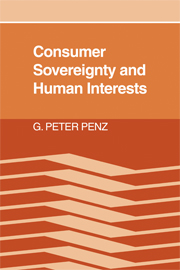Book contents
- Frontmatter
- Contents
- Preface
- Acknowledgments
- 1 Introduction
- Part I Consumer sovereignty
- Part II The range of wants
- Part III The quality of wants
- 5 Limits to individual rationality
- 6 The development of preferences and the evaluation circularity
- Part IV Measuring want satisfaction
- Part V Human interests and deprivation
- References
- Index
6 - The development of preferences and the evaluation circularity
Published online by Cambridge University Press: 25 October 2011
- Frontmatter
- Contents
- Preface
- Acknowledgments
- 1 Introduction
- Part I Consumer sovereignty
- Part II The range of wants
- Part III The quality of wants
- 5 Limits to individual rationality
- 6 The development of preferences and the evaluation circularity
- Part IV Measuring want satisfaction
- Part V Human interests and deprivation
- References
- Index
Summary
Interests, preferences, and the evaluation circularity
The evaluation circularity
To recognize that preferences, including ulterior preferences, are not simply given, but develop in a particular social context, is to open the door to a problem area that is still more serious for the interest-regarding optimization and evaluation in and of economic systems, as they have been conceived so far, than are the problems identified in the discussion of rationality. The problem area is that of feedback effects from the institutions and processes of production and distribution to the preferences that serve as the basis for identifying interests.
The significance of these feedback effects for optimization and evaluation is here described by the term “evaluation circularity.” It refers to the partial means–end inversion that is involved when the means (that is, the system of production and distribution or particular processes in it) that are to be optimized or evaluated with respect to the end (that is, the fulfillment of preferences that represent interests) shape the composition of this end. What is being evaluated determines, in part, the criterion by which it is being evaluated. It is as though the gauge to be used for measurement were to be calibrated, in the process of measurement, on the basis of characteristics of the particular object being measured.
- Type
- Chapter
- Information
- Consumer Sovereignty and Human Interests , pp. 87 - 120Publisher: Cambridge University PressPrint publication year: 1986



